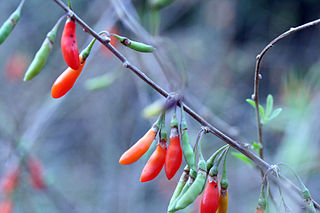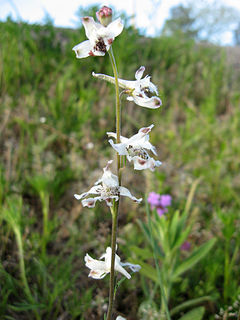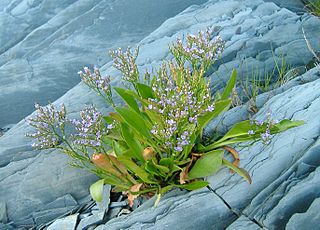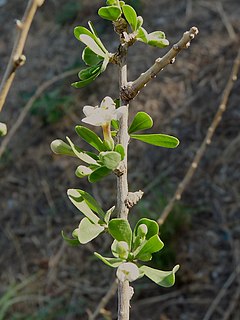
Goji, goji berry, or wolfberry, is the fruit of either Lycium barbarum or Lycium chinense, two closely related species of boxthorn in the nightshade family, Solanaceae. L. barbarum and L. chinense fruits are similar but can be distinguished by differences in taste and sugar content.

Lycium is a genus of flowering plants in the nightshade family, Solanaceae. The genus has a disjunct distribution around the globe, with species occurring on most continents in temperate and subtropical regions. South America has the most species, followed by North America and southern Africa. There are several scattered across Europe and Asia, and one is native to Australia. Common English names for plants of this genus include box-thorn and desert-thorn.

Lycium barbarum is a shrub native to China, with present-day range across Asia and southeast Europe. It is one of two species of boxthorn in the family Solanaceae from which the goji berry or wolfberry is harvested, the other being Lycium chinense.

Lycium chinense is one of two species of boxthorn shrub in the family Solanaceae. Along with Lycium barbarum, it produces the goji berry ("wolfberry"). Two varieties are recognized, L. chinense var. chinense and L. chinense var. potaninii. It is also known as Chinese boxthorn, Chinese matrimony-vine, Chinese teaplant, Chinese wolfberry, wolfberry, and Chinese desert-thorn.
Christmasberry can refer to any one of several shrubs or small trees, as well as their colorful fruit:

Lycium californicum is a spreading shrub in the nightshade family known by the common names California boxthorn and California desert-thorn.

Lycium andersonii is a species of flowering plant in the nightshade family, Solanaceae. Its common names include water-jacket, redberry desert-thorn, Anderson thornbush, Anderson's desert thorn, Anderson boxthorn, Anderson lycium, Anderson wolfberry, and squawberry.

Lycium ferocissimum, the African boxthorn or boxthorn, is a shrub in the nightshade family (Solanaceae). The species is native to the Western Cape, Eastern Cape, and Free State provinces in South Africa and has become naturalised in Australia and New Zealand. It is listed in Australia's Weed of National Significance list and is a declared noxious weed in the United States.

Geranium carolinianum is a species of geranium known by the common name Carolina crane's-bill, or Carolina geranium. This species is native to North America, where it is widespread and grows in many types of habitat. There are two varieties; Geranium carolinianum var. carolinianum and the Geranium carolinianum var. sphaerospermum. This is a summer or winter annual herb. It can be considered invasive depending on the region, when it is found in the United States it is considered to be native.

Rhododendron minus var. minus, the Carolina azalea or Carolina rhododendron, is a rhododendron species native to the mountains of North Carolina, South Carolina, Tennessee, and Northeast Georgia. It is commonly known as Rhododendron carolinianum in the horticultural trade.

Delphinium carolinianum, commonly known as Carolina larkspur, is a species of perennial flowering plant in the buttercup family. It is native to central and eastern North America, where it is found in prairies and rocky glades. It produces blue to white flowers in the spring.

Loxostege albiceralis is a moth in the family Crambidae. It was described by Augustus Radcliffe Grote in 1878. It is found in North America where it has been recorded from southern California and Nevada to Texas. The habitat consists of arid areas and deserts.
Loxostege floridalis, the Christmas-berry webworm moth, is a moth in the family Crambidae. It was described by William Barnes and James Halliday McDunnough in 1913. It is found in North America, where it has been recorded from Florida and Texas.
Cirsium carolinianum is a North American species of plants in the thistle tribe within the sunflower family. Common name is Carolina thistle or purple thistle or soft thistle or smallhead thistle. The species is native to the central and southern United States, from eastern Texas east to Virginia and the Carolinas, north to the Ohio Valley.

Limonium carolinianum, known variously as Carolina sealavender, canker root, ink root, marsh root, lavender thrift, American thrift, or seaside thrift, is a species of flowering plant native to the eastern shores of North America, from northern Mexico to Canada. It is a slow-growing perennial herb found in salt marshes and other maritime habitats. Its inflorescences are frequently harvested for use in cut flower arrangements.
Hypericum lycium is a species of flowering plant in the family Hypericaceae which is endemic to Turkey.

Lycium europaeum, the European tea tree, European box‑thorn, or European matrimony‑vine, is a species of flowering plant in the family Solanaceae. It is native to the entire Mediterranean region, and has been introduced to the Canary Islands, Madeira, and the Balearic Islands. Its fruit is edible.

Lycium intricatum is a species of plants in the family Solanaceae (nightshades).













